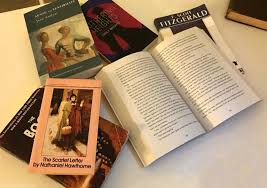The Timeless Appeal of Classic Literature
Classic literature holds a special place in the hearts of readers around the world. These timeless works have stood the test of time, captivating generations with their rich storytelling, complex characters, and profound themes.
From the romantic tragedies of Shakespeare to the social commentary of Dickens, classic literature offers a glimpse into different eras, cultures, and perspectives. These books not only entertain but also educate and provoke thought.
One of the defining features of classic literature is its enduring relevance. Themes such as love, betrayal, ambition, and justice are universal and continue to resonate with readers today. Through these stories, we can explore the depths of human nature and reflect on our own lives.
Moreover, classic literature provides a valuable insight into history and society. Works like “Pride and Prejudice” by Jane Austen or “1984” by George Orwell offer a window into the past while raising important questions about power dynamics, social norms, and individual freedom.
Whether you’re delving into the tragedies of Greek mythology or exploring the adventures of Sherlock Holmes, classic literature offers a treasure trove of literary gems waiting to be discovered. So pick up a classic novel, immerse yourself in its world, and let its timeless appeal enchant you once again.
Exploring Classic Literature: Essential Reads, Understanding, and Modern Perspectives
- What are some must-read classic literature books?
- How can I appreciate and understand classic literature better?
- What defines a book as a ‘classic’ in literature?
- Who are some of the most famous authors of classic literature?
- Are there any modern adaptations or retellings of classic literature books?
- Why is it important to study and preserve classic literature?
What are some must-read classic literature books?
When it comes to must-read classic literature books, the options are abundant and varied, catering to a wide range of tastes and interests. From the timeless tragedies of William Shakespeare’s plays like “Romeo and Juliet” and “Hamlet” to the insightful social critiques found in Charles Dickens’ novels such as “Great Expectations” and “Oliver Twist,” there is something for everyone in the world of classic literature. Jane Austen’s witty comedies like “Pride and Prejudice” and Emily Brontë’s haunting tale “Wuthering Heights” are also perennial favourites that continue to captivate readers with their enduring themes and compelling characters. Whether you’re drawn to romance, mystery, or philosophical musings, exploring these must-read classics is sure to enrich your literary journey.
How can I appreciate and understand classic literature better?
To appreciate and understand classic literature better, it is essential to approach these timeless works with an open mind and a willingness to delve deep into their themes, characters, and historical context. Start by researching the author’s background, the time period in which the book was written, and any significant events that may have influenced the narrative. Take your time to read slowly and attentively, allowing yourself to immerse in the language and nuances of the text. Consider discussing the book with others or joining a book club to gain different perspectives and insights. Lastly, don’t be afraid to revisit classic literature multiple times; each reading can reveal new layers of meaning and appreciation for these enduring masterpieces.
What defines a book as a ‘classic’ in literature?
In the realm of literature, the classification of a book as a ‘classic’ is a subject of much debate and contemplation. While there is no definitive answer to what defines a classic, several key criteria often come into play. A classic work of literature is typically considered to possess enduring literary merit, with themes that resonate across time and cultures. It often explores universal truths about the human condition, offers profound insights into society or individuals, and demonstrates exceptional craftsmanship in terms of writing style and structure. Additionally, classics are often influential, inspiring other works and shaping literary traditions. Ultimately, the status of a book as a classic is bestowed by readers, scholars, and literary critics who recognise its lasting significance and impact on the world of literature.
Who are some of the most famous authors of classic literature?
When exploring the realm of classic literature, one inevitably encounters a rich tapestry of renowned authors whose works have left an indelible mark on literary history. From the poetic brilliance of William Shakespeare and the insightful social commentary of Charles Dickens to the captivating storytelling of Jane Austen and the philosophical depth of Fyodor Dostoevsky, these iconic figures have defined the landscape of classic literature with their timeless masterpieces. Their enduring legacy continues to inspire readers and scholars alike, making them pillars of literary excellence for generations to come.
Are there any modern adaptations or retellings of classic literature books?
In response to the frequently asked question about modern adaptations or retellings of classic literature books, the literary world has seen a surge in creative reinterpretations of timeless tales. Authors and filmmakers have breathed new life into classic works such as “Pride and Prejudice,” “Jane Eyre,” and “Frankenstein” by offering fresh perspectives, setting them in contemporary settings, or exploring alternative narratives. These modern adaptations not only pay homage to the original stories but also introduce them to a new generation of readers and viewers, showcasing the enduring influence and adaptability of classic literature in today’s cultural landscape.
Why is it important to study and preserve classic literature?
Studying and preserving classic literature is crucial for several reasons. Firstly, these timeless works offer valuable insights into the cultural, social, and historical contexts of the time in which they were written. By delving into classic literature, we can gain a deeper understanding of human nature, societal norms, and the evolution of ideas over centuries. Additionally, preserving these literary masterpieces ensures that future generations have access to a rich tapestry of stories and wisdom that have shaped our collective consciousness. Classic literature serves as a bridge between the past and the present, connecting us to our roots while inspiring new perspectives and interpretations for the future.

